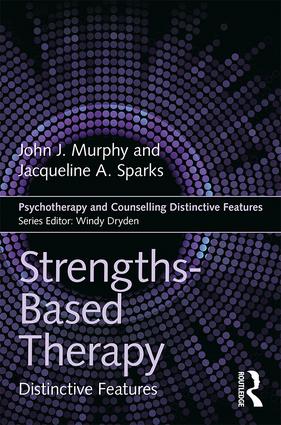Strengths-Based Therapy offers an introduction to what is distinctive about this innovative client-directed approach. Written by two experienced practitioners of strengths-based therapies, this book translates SBT principles and practices into concise, evidence-based ideas and techniques that mental health practitioners can immediately apply on the job. Using the popular Distinctive Features format, this book describes 15 theoretical features and 15 practical techniques of Strengths-Based Therapy.
Strengths-Based Therapy will be a valuable resource for psychotherapists, clinical, health and counselling psychologists, counsellors, psychiatrists, marriage and family therapists, social workers, and all who wish to know more about this unique approach to therapy.
Contents:
- Foreword
- Preface
- Acknowledgements
- Abbreviations
- Part 1 DISTINCTIVE THEORETICAL FEATURES OF SBT
- 1 History of SBT
- 2 SBT as trans-theoretical and value added
- 3 Clients as heroes of change
- 4 SBT as client directed
- 5 SBT and therapist factors
- 6 SBT and the therapeutic alliance
- 7 SBT and hope
- 8 SBT and social constructionism
- 9 SBT language and practices
- 10 SBT and diagnosis
- 11 SBT as systemic
- 12 Cultural considerations in SBT
- 13 Social justice and SBT
- 14 SBT and client feedback
- 15 Challenges of SBT practice
- Part 2 DISTINCTIVE PRACTICAL FEATURES OF SBT
- 16 Being respectfully curious
- 17 Validating clients
- 18 Instilling hope
- 19 Exploring clients’ theories of change
- 20 Exploring clients’ desired future
- 21 Recruiting client resources
- 22 Listening for change
- 23 Asking resilience and coping questions
- 24 Building on exceptions
- 25 Co-creating new stories
- 26 Using between-session strategies
- 27 Collecting systematic client feedback
- 28 Creating strengths-based work environments
- 29 Integrating SBT into training and supervision
- 30 Acting for social justice
- Appendix A
- References
- Index
- Figure
Author Bio:
John J. Murphy, Professor of Psychology at the University of Central Arkansas (USA), is an internationally recognised clinician and trainer of client-directed, strengths-based therapies. His books have been translated into multiple languages and he has trained thousands of helping professionals throughout the world.
Jacqueline A. Sparks is a Professor of Couple and Family Therapy in the College of Health Sciences at the University of Rhode Island (USA). She has written and trained extensively on the use of systematic client feedback in psychotherapy to promote client voice and choice.
Review:
“Read Strength-Based Therapy and improve your therapeutic success rate. Murphy and Sparks share a thought-provoking non-pathologizing therapy in which client wisdom is championed as a major ingredient of successful outcome. They generously illustrate this with their wealth of clinical experience—showing their embodiment of respect and humility, and importantly, exemplifying ‘doing social justice” – Harlene Anderson, Ph.D., International Consultant, The Toas Institute, Houston Galveston Institute.







